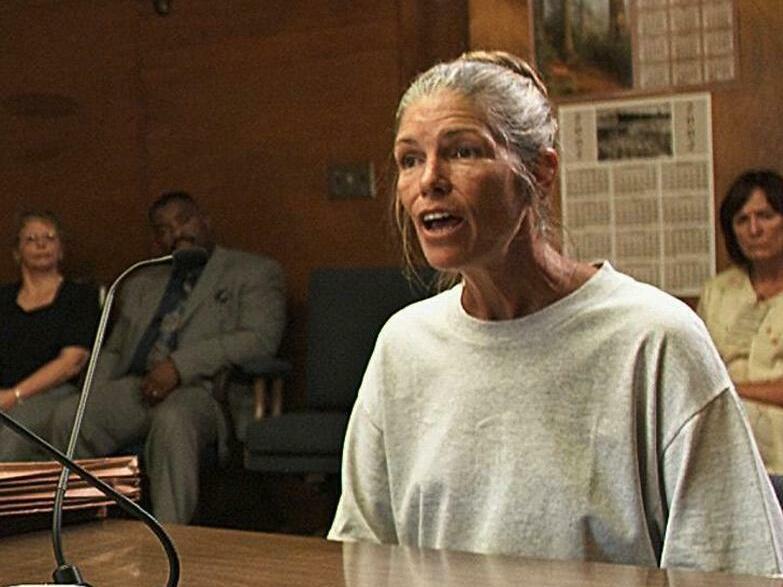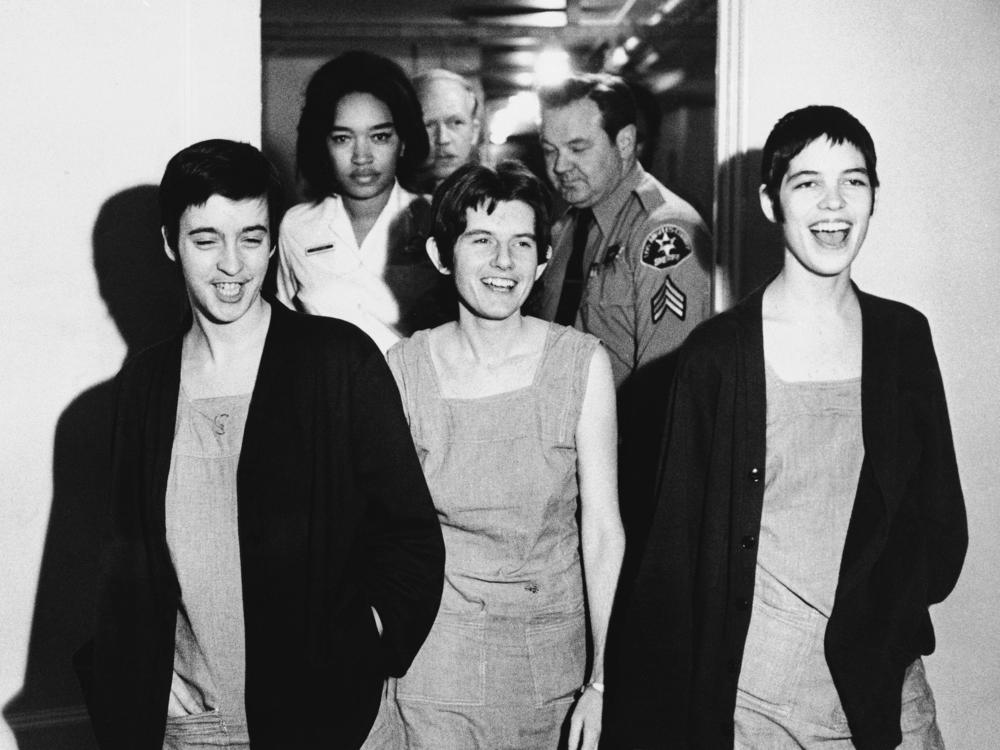Section Branding
Header Content
A former Manson Family member is free, after her parole was reversed 5 times
Primary Content
Leslie Van Houten, whose devotion to Charles Manson resulted in her participating in the brutal murders of a married couple inside their Los Angeles home in 1969, is free after spending 53 years in custody.
Van Houten, who is in her 70s, left the California Institution for Women in Corona on Tuesday, less than a week after Gov. Gavin Newsom said he would not fight a state appeals court's ruling that said the former "Manson Family" member should be granted parole.
"Ms. Van Houten was released on parole July 11, 2023 and was picked up by a Division of Adult Parole Operations team," William Newborg, public information officer at the California Institution for Women, told NPR.
Van Houten was freed after she was denied parole more than 20 times, as member station LAist reports. She was 19 when she committed the crimes.
"Leslie is very pleased that her hard work in reforming herself in prison over the past five decades has been recognized by the parole board and appellate court," Van Houten's attorney, Nancy Tetreault, told NPR.
Tetreault said her client is working to adjust to the idea of life outside of prison, after decades of social, cultural and technological changes have passed her by.
"She will spend the next year in a transitional living facility," Tetreault said, adding that Van Houten is weighing where she might work, and looking forward to seeing relatives and friends.
Here's a quick recap of Van Houten's past and how she eventually left prison:
Manson cult's brutal murders aimed at a race war
Van Houten was convicted in the murders of Rosemary LaBianca and her husband, supermarket executive Leno LaBianca, in their home in the Los Feliz neighborhood.
Manson had convinced his followers that such killings were necessary to spark "an impending bloody, civilization-ending, worldwide race war between Blacks and Whites," as court documents note. In August of 1969, Manson began orchestrating shockingly gruesome murders.
In years of testimony and interviews, Van Houten told authorities that after being taken to the LaBiancas' residence, she held Rosemary LaBianca down as other Manson followers, Patricia Krenwinkel and Charles "Tex" Watson, stabbed her. Van Houten then stabbed the woman more than a dozen times.
"The next morning, Mrs. LaBianca's teenaged son discovered Mr. LaBianca's body with a knife stuck in his neck, a carving fork protruding from his stomach, and the word 'war' carved into his skin," Newsom noted in his reversal.
The LaBianca killings took place shortly after Manson's cult members murdered actress Sharon Tate, who was pregnant, along with Abigail Folger, Wojciech Frykowski, Steven Parent and Jay Sebring. Van Houten was not part of that attack; court papers show she felt "left out" and wanted to join in the next violence.
Van Houten was arrested in November of 1969; after years of court proceedings and reversals, she was sentenced to seven years to life in prison, convicted on two counts of first-degree murder and one count of conspiracy.
The convicted murderer fought a long legal battle
The California Board of Parole Hearings recommended Van Houten for parole five times, starting in 2016. But Newsom and former Gov. Jerry Brown reversed those decisions, citing the heinous crimes and saying Van Houten remained a threat to public safety.
Explaining his 2022 decision, Newsom commended Van Houten for expressing remorse and working to rehabilitate herself. But he also said, "Ms. Van Houten has not sufficiently mitigated her risks for substance use relapse and distorted thinking leading to antisocial conduct in response to stressors."
But in May, a state appeals court granted Van Houten's petition for writ of habeas corpus, saying there were no grounds for her continued incarceration and that she should be released. It also noted that she has given a detailed accounting of the circumstances that led her to fall under Manson's thrall, and that she has expressed regret at not leaving before the cult enacted grisly and violent murders.
"The Governor's refusal to accept Van Houten's explanation amounts to unsupported intuition," the court stated.
The victims' relatives voiced their frustration at news of her parole.
"My family and I are heartbroken because we're once again reminded of all the years that we have not had my father and my stepmother with us," Cory LaBianca, Leno LaBianca's daughter, told the Associated Press last Friday.
Van Houten and other cult members convicted of murder were initially sentenced to death, but soon afterward, California's Supreme Court ruled capital punishment was unconstitutional.
"All of them should've been executed way back in 1971, and I asked for the death penalty," Manson family prosecutor Vincent Bugliosi told NPR in 2009.
Van Houten earned two degrees in prison
"From a legal standpoint, this is a very important case because it underscores that the law must be applied evenhandedly regardless of the inmate's notoriety," Tetreault, Van Houten's attorney, told NPR.
As an inmate, Van Houten was active in self-help and substance abuse programs, took on volunteer work and maintained "a laudable disciplinary record," as Newsom noted. She also earned bachelor's and master's degrees and completed vocational training, preparing for a possible return to society.
Those personal gains came decades after Van Houten's life was derailed by turbulent teenage years and joining Manson's cult.
In her own accounting, she became a heavy user of LSD and other drugs at 14, after her parents divorced. When she got pregnant at age 17, her mother coerced her into getting an illegal and unmedicated abortion in her own home.
"It was in my bedroom ... some woman came up from Mexico," Van Houten said, according to court documents. "She told me to just be quiet and not wake my brother or sister."
Charles Manson died in 2017 at age 83. Van Houten's fellow attackers in the LaBianca killings, Krenwinkel and Watson, remain in prison.
Krenwinkel was approved for parole last year, but Newsom reversed it in the same report that included his decision against Van Houten.
Copyright 2023 NPR. To see more, visit https://www.npr.org.


